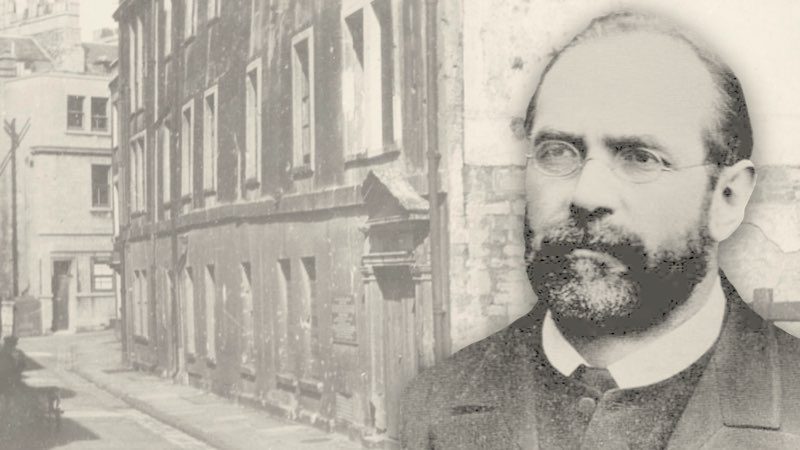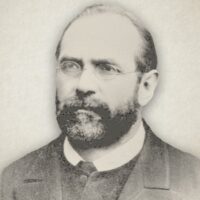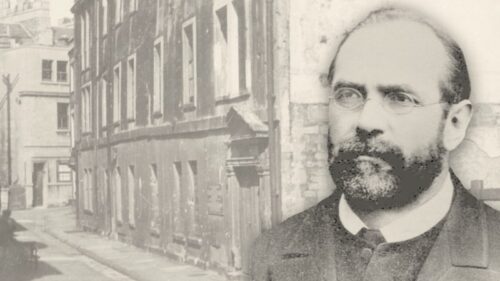
The Life And Testimony Of Edward Carr
Gospel Magazine 1899:
The spiritually minded and Christ-exalting author of those monthly articles in this Magazine, bearing the title “The Loveliness of Christ,” deserves a niche among the worthies whom—for the grace of God that is in them—we delight to honour, in so far as our Portrait page is concerned. “And we beseech you, brethren, to know them which labour among you, and are over you in the Lord, and admonish you; and to esteem them very highly for their work’s sake.” There is a special pleasure in “knowing” the faithful servants of Christ, in features and by report, whom we have never met in the body. And it is one of the felt privileges of our own editorial position to introduce to our readers authentic likenesses of those who in times of abounding error are witnessing for the truth of God by life, and lip, and pen. Not that our beloved brother, the Rev. Edward Carr, needs any “introduction” to such of our friends as have read the Gospel Magazine during the past twenty years, for his Scriptural contributions have extended over that prolonged period, and have thus made his name a household word among the lovers of sound doctrine, wise counsel, and deep spiritual experience. We are glad of the present opportunity to express our great obligations to Mr. Carr for the continuation of his valuable assistance, after his having written for the Magazine, during the editorships of beloved Dr. Doudney and Mr. Cowell. Such expository teaching as his monthly articles supply meets one of the most practical of the Church’s needs in an age of shallow, religious knowledge, and superficial profession. Mr. Carr’s transparent aim is to magnify the name and fame of the Lord Jesus Christ, and to trace the footsteps of the flock in the old paths of Gospel peace and plenty. For a deeply interesting record of his call by Divine grace, and the subsequent leadings of a Covenant-keeping God, we are indebted to an autobiography entitled Chronicles of a Chequered Pathway. The following is the opening chapter of the work. Mr. Carr writes:—
I was born May 26th, 1851, in Amersham Road, New Cross, near London, from whence my parents removed to Ashdown Villa, Wickham Terrace, New Cross, while I was yet an infant. My father’s name was John Carr. He was in business at 20, Lawrence Lane, Cheapside, London, as a wholesale Manchester merchant. My grandfather on the paternal side was a grocer and draper, at Frant, near Tunbridge WeIls, in Kent. He was a godly, gracious, man, and lived to see many of his children brought to know the Lord, and also blessed with a moderate share of prosperity in temporal things.
My mother was the daughter of a solicitor in Bermondsey, who died when she was quite young. There were five children, the offspring of a former marriage—three brothers, who subsequently succeeded to my father’s business, and two sisters, both since dead. One of them, Harriet, died in the year 1860, making a very blessed end. The Lord gave her Romans 8:18, resting on which she fell asleep in Jesus, aged nineteen years. Her remains lie in Nunhead Cemetery, awaiting the resurrection of the just.
I have a sister and brother still spared, who with my mother have long resided in Brighton. We attended the ministry of Mr. James Wells, of the Surrey Tabernacle, in the Borough Road, where my father was deacon for some years.
From quite early childhood I was exercised about eternal things. This concern arose in the following way: One Sabbath morning I was sitting in chapel, when about eight years old, between two ladies who liked to have me in their seat. My attention was attracted by the peculiarly solemn manner in which Mr. Wells gave out his text: “Jacob have I loved, and Esau have I hated.” As he proceeded to describe the difference between the two characters I was made to see and feel, to my great dismay, that my character was not that of the loved Jacob; but that of the hated Esau. The fear of perishing took possession of my heart, and I well remember that I lay awake a long time that night, weeping bitterly because I felt I was destitute of the marks and evidences which Mr. Wells had described the children of God as possessing. If so, I knew I was among the wicked, with whom God is angry every day. Oh how I did desire and long to be found among the people of God; and yet how impossible it seemed that one like me could ever be numbered with them.
From that time I was made to feel that the most important concern of my life was to have my sins pardoned. In those childhood days it was an abiding feeling in my heart that I should not mind dying if I could be sure my sins were forgiven. This longing was interwoven with my thoughts, feelings, and desires; although I sometimes got very careless and indifferent, and was of course very ignorant of spiritual things. My favourite hymn as a child was that which most sweetly described the blessedness I sought, but often feared I should never attain—
“How high a privilege ’tis to know
Our sins are all forgiven;
To bear about this pledge below,
This special grant of heaven!”
Thus I began, as I humbly trust, to seek for mercy; and the death of my sister Harriet made a deep impression on my mind. I saw the reality of religion. Sometimes I derived a little encouragement, hope, and help from the preached Word; and very often did I repeat to myself some lines of Mr. Hart’s, which at this period of his ministry Mr. Wells used frequently to quote—
“Those feeble desires, those wishes so weak,
‘Tis Jesus inspires, and bids you still seek.”
I knew little then of the deceitfulness of my own heart, nor of the exceeding sinfulness of sin; neither could I understand what I was passing through in my feelings. The nature of the exercises of my mind was hidden from my eyes. Not until years brought increased knowledge and experience could I trace with any satisfaction the first workings of the Spirit of God upon my heart. In those days I thought, if I should ever be converted, it would be by being cut down, experiencing the terrors of the law, and feeling bitterly the wretchedness of sin. Without a great deal more of these experiences than I possessed I could not believe I was right; and I used in my simple, childish way, to pray that I might know more of God’s judgments, feel more deeply troubled about sin than I did, and be shaken over hell as I heard many talk about, who insisted on this as the only right beginning. I little knew then what the Lord had in store for me in the future.
Nevertheless, I hope He had, even at that time, implanted a principle of divine life in my soul, and I trust those feelings, wishes, prayers, and desires of a spiritual nature were the first buddings forth of that life.
After attending preparatory schools, when eleven years of age I was sent to a boarding school at Horsham, under the charge of a Mr. Collins, who was a good man, where we attended the ministry of Mr. Edward Mote, the author of the hymn, “My hope is built on nothing less.” The school was soon removed to Redhill, but Mr. Collins shortly after died, and his body lies interred in the chapel yard at Horsham. After his death I went to a private school at the Grove, Blackheath, as a daily boarder, being about twelve years of age, where I continued till I left school in the year 1867.
During this period we attended the ministry of Mr. Wells very regularly, driving up from New Cross twice on the Lord’s Day. Many times my spirit was cheered in listening to the Gospel from his lips; and I was often glad to return home on the box seat that I might in silence meditate on the truths to which we had been listening. I began to learn more of myself, and the love of solitude grew upon me. I had thoughts and feelings which I could not tell to anyone. I often fancied no one understood me, and indeed I could not understand myself. Sometimes I hoped I was a real child of God, and even rejoiced in hope; and then again I sunk into deepest despondency, and was ready to give all up. The hidden evils within were gradually unfolded. But the ministry was made very useful to me, and my happiest hours were spent in the house of God.
In the next chapter I will try and recall some memories of the old Surrey Tabernacle, especially as there are a goodly number still living to whom that hallowed sanctuary was made a Bethel.
My life outwardly was, except in the reserve I maintained, much like that of other boys; but though I sometimes got very, very careless, I never quite lost the inward sense of “the aching void the world can never fill.”
The steps in God’s providence which led Mr. Carr into the ministry of the Gospel are full of interest, but we must refer the reader to the volume itself, which, it should be added, may be procured from the Author, 13, Livingstone Villas, Bath. It was in the year 1892 that he accepted the Pastorate of Providence Chapel, Bath, where his faithful ministrations have been sealed and certified by the Holy Spirit. As a sample of his able and instructive discourses, a published sermon, based on the passage, “We must through much tribulation enter into the kingdom of God,” and entitled, A Vision of the Way to Heaven, may be mentioned. Its tone is mellow, its experience deep, and its teaching rich in consolation for the tried children of God’s one family. Our beloved brother has our warm prayers for the Divine blessing in his own soul and in our Master’s service.
Edward Carr (1851-1920) was a Strict and Particular Baptist Preacher. He grew up under the gospel ministry of James Wells, his father serving as a deacon of the church meeting at Surrey Tabernacle, Borough Road. His first two pastorates were with the churches meeting at Sleaford and Leicester. His last pastorate was with the church meeting at Providence Chapel, Bath, a position he held for twenty-seven years (1893-1920).




